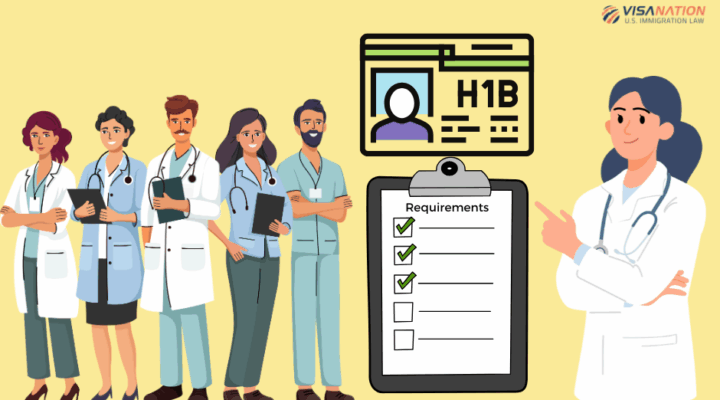Foreign medical graduates often desire to leave their country to further their careers in the United States. The H-1B visa is a highly sought-after path for foreign professionals in specialty occupations within the U.S. However, obtaining an H-1B visa for doctors and physicians is highly competitive and comes with its own unique requirements.
Because of the high demand for H-1B visas, which are dual intent, having your application approved for an H-1B visa is not always easy. Having a thorough understanding of the visa requirements and heeding legal counsel can help you avoid common delays and pitfalls.
Historically, many physicians have used the J-1 visa for medical training in the U.S. This option, however, came with a two-year home residency requirement after medical training that was often hard to fulfill. Now, under the Immigration and Nationality Act of 1990, medical professionals were able to apply for the H-1B visa for doctors to avoid the residency requirement.
U.S. employers are allowed to legally hire qualified foreign professionals temporarily based on their specialized skills. In order to be eligible for the H-1B visa, the U.S. employer as well as the potential employee must follow the USCIS conditions and regulations. The visa requirements strive to ensure that the U.S. employer and foreign professional comply with the Department of Labor standards.
H-1 B Opportunities For Foreign Medical Graduates
An H-1B visa for doctors and medical professionals can be obtained by applicants who aim to:
- To teach or conduct research at a public or private nonprofit educational institution
- To participate in a residency program
- For employment with a U.S. company that complies with USCIS conditions and regulations as a physician or doctor
Because medical staff shortages are common across the U.S., there are often available H-1B roles for foreign medical graduates in hospitals, clinics, and educational institutions. These shortages create opportunities for foreign medical professionals, making H-1B sponsorship more accessible.
H-1B Application Process
The U.S. Department of Labor classifies the H-1B application process into three steps:
- Submit a labor condition application (LCA) to the Office of Foreign Labor Certification (OFLC). The employer submits the LCA (ETA 9035) attesting that the H-1B applicant will not unfavorably affect the wages and working conditions of similarly employed U.S. workers.
- Once the LCA has been certified by the OFLC, the employer submits it to the USCIS along with the “Petition for Nonimmigrant Worker,” Form I-129. While the petition includes some of the same information as the LCA, the USCIS reviews information on both documents to determine whether the job meets the requirements of a specialty occupation. It also decides whether the prospective H-1B worker meets the statutory requirements in that occupation. USCIS approval is provided by Form I-797.
- Any foreign workers located outside the U.S. should go to the Department of State (DOS) to obtain an H-1B visa stamp to work in the U.S. with a specific employer for a designated calendar period. If the foreign worker is already in the United States, USCIS provides the non-immigrant an I-797 approval notice, which gives the individual the ability to work pursuant to the approved H-1B petition.
Once an employer obtains the certified LCA and the approved petition, the Wage and Hour Division (WHD) enforces the attestations within the LCA. This includes the material facts and labor condition statements.
Breaking: Trump Introduces $100,000 Fee for New H-1B Petitions. Read our article to learn about the exclusions and best strategies to navigate.
H-1B Visa Requirements for Doctors and Physicians
- The position that you are seeking must be a specialty occupation by definition. Fortunately, medical professionals qualify as specialty occupations.
- You must be paid at least the actual or prevailing wage for your occupation, which is defined by the Department of Labor’s (DOL) regulations.
- The employer must file an H-1B petition on behalf of the doctor or physician. They must also work for the petitioning employer and follow the terms of the approved H-1B status. The doctor or physician may work part-time for more than one hospital if each hospital petitions the medical professional.
- Physicians and doctors must demonstrate that they’ve earned and possess a degree from an accredited medical school in the U.S. or have a foreign degree equivalent to an M.D. degree in the U.S.
- Applicants must demonstrate competency in both written and oral English examinations administered by the Educational Commission for Foreign Medical Graduates (ECFMG).
- You must have passed parts of the United States Medical Licensing Examination (USMLE) that are acceptable to the state of employment.
- To get an H-1B visa for doctors, you must have an unrestricted state license or other authorization required by the state of intended employment that allows you to practice medicine in your given state, or have the authorization to practice medicine. Every state has unique requirements regarding postgraduate medical training, educational requirements, and licensing requirements.
- In order to enter the U.S. to participate in medical training programs, you must first obtain ECFMG certification.
What Documents Are Required?
Having the right documents completed and sent to the right places can be the difference between success and failure when applying for an H-1B visa for doctors. To apply, you will need:
- A copy of your diploma from medical school, along with your transcript and list of courses.
- A certificate from the Educational Commission for Foreign Medical Graduates (ECFMG)
- English Competency (Written and Oral)
- The passing results from your USMLE (Steps 1, 2CK, and 3 or acceptable equivalents)
- A copy of your valid passport
- A copy of, or other evidence of, your state medical license or permit/authorization
Contact VisaNation attorneys for help filing your H-1B petition as a doctor.
Annual H-1B Cap
One of the disadvantages of the H-1B visa for doctors is that you will most likely be subject to the annual lottery. In past years, the USCIS has placed a cap on H-1B petition approvals, limiting the total number of H-1B visas issued to 85,000 each year.
Initially, 65,000 petitions will be randomly selected, and then an additional 20,000 will be set aside for applicants who hold a master’s degree or higher, according to the advanced degree exemption. Last year, the USCIS received 358,737 petitions, which means that the H-1B visa is a highly competitive route.
Exemptions
However, there are a few exceptions that will qualify you as exempt from this lottery:
- If you have already been counted against the lottery and wish to transfer your status to a different employer.
- If you are working for a non-profit organization, an institute of higher education, or a state, local, or federal governmental research organization.
Most H-1B visa medical residency positions are offered by university-affiliated teaching hospitals, which are typically cap-exempt. This means that H-1B petitions can be filed year-round without being subject to the annual lottery.
President Trump has signed a new proclamation introducing a $100,000 fee for new H-1B petitions. This change could impact employers and foreign workers planning to apply, but exclusions apply.Read our full article for more details
Duration of Stay
After fulfilling the requirements and application process for the H-1B visa, your H-1B visa will either be approved or denied. If it is approved, your H-1B visa is generally granted initially for up to three years and can be extended to a maximum of six years.
It is important to note that you can travel freely in and out of the U.S. with your H-1B visa being stamped into your passport. Your duration of stay amounts to the actual time you’ve spent in the U.S. If you travel abroad, you will be able to recapture any time spent outside the U.S. to ensure that you receive your full six-year stay.
If you wish to stay longer than six years, you can apply to become a lawful permanent resident while holding an H-1B visa. The H-1B is a non-immigrant and dual intent visa, which gives you the opportunity to obtain a U.S. green card and to remain in the U.S. longer to continue to pursue your medical career.
Dependents of Doctors and Physicians
Spouses and unmarried children under the age of 21 can enter the U.S. with the H-1B visa holder under the H4 dependent visa category. An H4 Visa holder is allowed to live in the U.S. as long as the H-1B visa holder continues to follow all guidelines and regulations along with H-1B visa requirements, to remain in legal status.
Generally, H4 visa holders are not allowed to gain employment in the U.S. However, according to USCIS, there are certain cases in which H4 dependent spouses can apply for employment authorization. Dependents may also attend school and perform daily tasks such as driving, after obtaining a state driving license.










